 An Idaho company has demonstrated the marketing power of a little religious studies knowledge, producing Jihawg Ammo, which is coated in pork-infused paint. The company asserts, “With Jihawg Ammo, you don’t just kill an Islamist terrorist, you also send him to hell. That should give would-be martyrs something to think about before they launch an attack.” The company tags the product “Peace through pork” because it “promotes peace through the natural deterrence of pork infused ballistic coating.” Continue reading “Marketing and Competing Essentialisms”
An Idaho company has demonstrated the marketing power of a little religious studies knowledge, producing Jihawg Ammo, which is coated in pork-infused paint. The company asserts, “With Jihawg Ammo, you don’t just kill an Islamist terrorist, you also send him to hell. That should give would-be martyrs something to think about before they launch an attack.” The company tags the product “Peace through pork” because it “promotes peace through the natural deterrence of pork infused ballistic coating.” Continue reading “Marketing and Competing Essentialisms”
The Ambivalence of Intellectuals

“intellectuals are holders of cultural capital and, even if they are the dominated among the dominant, they still belong among the dominant. That is one of the foundations of their ambivalence….”
So wrote the French sociologist Pierre Bourdieu (d. 2002), in the closing lines to a 1996 address entitled “The Myth of ‘Globalization’ and the European Welfare State” (published in his little book, Acts of Resistance [29-44]). I think these lines are well wroth remembering when we read scholarship that writes against the grain, as some call it, or which undermines elite narratives by doing history from the ground up (what we once called social history). For, despite what they likely see as their own noble goals, the supposedly silenced voices that they recover are the products of their own travel grants, sabbaticals, and the privilege that comes with earning ones living by writing and talking about features of other people’s lives that strike us as interesting. Continue reading “The Ambivalence of Intellectuals”
You Made Me What I Am Today
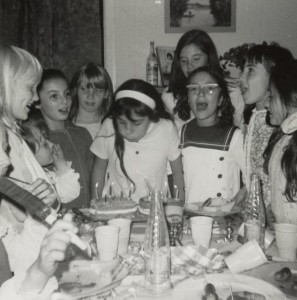 National Public Radio’s science correspondent, Shankar Vedantam, reported yesterday on some empirical research on the effects of people doing those patterned and repetitive, rule governed behaviors that we call rituals.
National Public Radio’s science correspondent, Shankar Vedantam, reported yesterday on some empirical research on the effects of people doing those patterned and repetitive, rule governed behaviors that we call rituals.
You can listen to the story here.
The punchline is that, according to researchers at the Harvard Business School (hardly the only place doing empirical, experimental research on ritual, of course), rituals like singing “Happy Birthday to You” and blowing out candles on the cake prompt people to report that, when they later eat it, the cake is more satisfying and tastes better (and that they’re even willing to pay more for it). As Vedantam sums up the findings: “Rituals seem to increase anticipation and make people more mindful of what they were eating. Performing a ritual before you eat a carrot apparently makes the carrot more tasty than it was before.” Continue reading “You Made Me What I Am Today”
WE WON!
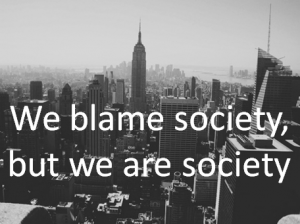 One of the most interesting ways that we talk about ourselves, in my opinion, lies in the ways that we think we’re not talking about ourselves. For instance, in the courses that I teach on gender, students constantly remark that “society tells us that women need to wear makeup and tight clothing to be perceived as beautiful” at the same time as they sit before me (in makeup and tight clothing) talking about both “oppressive” practices. Continue reading “WE WON!”
One of the most interesting ways that we talk about ourselves, in my opinion, lies in the ways that we think we’re not talking about ourselves. For instance, in the courses that I teach on gender, students constantly remark that “society tells us that women need to wear makeup and tight clothing to be perceived as beautiful” at the same time as they sit before me (in makeup and tight clothing) talking about both “oppressive” practices. Continue reading “WE WON!”
The Way We Were…?
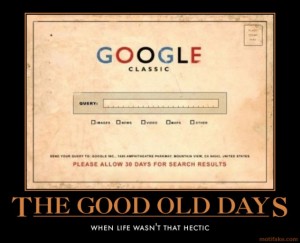 I’ve always been fascinated by those birthday cards that offer a little personalized nostalgia for yesteryear to our elderly loved ones who are able to tell us stories about “back in the day when…” I’m talking specifically about the cards that you typically see in gas stations and Cracker Barrels, the ones that try to give a societal snapshot from the day someone was born. They remind my father (born in 1942), for example, that the hit single on the day of his birth was Bing Crosby’s “White Christmas” (it had recently overtaken “[I’ve Got a Gal in] Kalamazoo”) and that gas back then cost only 19 cents a gallon. For that matter, the 19-cent gas would have fueled a new car that someone could buy for just over a thousand bucks. And so on. Continue reading “The Way We Were…?”
I’ve always been fascinated by those birthday cards that offer a little personalized nostalgia for yesteryear to our elderly loved ones who are able to tell us stories about “back in the day when…” I’m talking specifically about the cards that you typically see in gas stations and Cracker Barrels, the ones that try to give a societal snapshot from the day someone was born. They remind my father (born in 1942), for example, that the hit single on the day of his birth was Bing Crosby’s “White Christmas” (it had recently overtaken “[I’ve Got a Gal in] Kalamazoo”) and that gas back then cost only 19 cents a gallon. For that matter, the 19-cent gas would have fueled a new car that someone could buy for just over a thousand bucks. And so on. Continue reading “The Way We Were…?”
God of the New Slaves
 If you are waiting for Jesus’s second coming, today is the day, in the sonic form of Yeezus – Kanye West’s 6th solo album that has everyone talking, criticizing, buzzing, praising, and worshipping. Like the figure Jesus – and many scholars, I might add – Kanye is a master rhetorician (so don’t worry about his lyrics becoming flesh). He takes words, and twists and bends them into pliable strategies that more often than not work well for his market. He commands power and authority – not by virtue of what he claims, confesses, and professes – but rather, by using the pre-packaged power and authority that society has granted to particular words (and ideas) – like slave and god. Social theorist Bruce Lincoln reminds us that things such as authority are not entities unto themselves. Rather, they are effects that have to be authorized in particular ways across time and space. So what’s all the hype about? Continue reading “God of the New Slaves”
If you are waiting for Jesus’s second coming, today is the day, in the sonic form of Yeezus – Kanye West’s 6th solo album that has everyone talking, criticizing, buzzing, praising, and worshipping. Like the figure Jesus – and many scholars, I might add – Kanye is a master rhetorician (so don’t worry about his lyrics becoming flesh). He takes words, and twists and bends them into pliable strategies that more often than not work well for his market. He commands power and authority – not by virtue of what he claims, confesses, and professes – but rather, by using the pre-packaged power and authority that society has granted to particular words (and ideas) – like slave and god. Social theorist Bruce Lincoln reminds us that things such as authority are not entities unto themselves. Rather, they are effects that have to be authorized in particular ways across time and space. So what’s all the hype about? Continue reading “God of the New Slaves”
But Which is Hip to Drink?
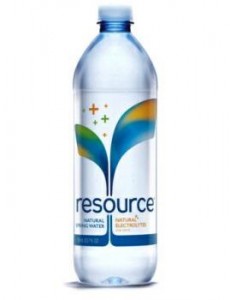 Have you heard of Nestlé’s new product “Resource”? With bottled water a competitive $11.8 billion international industry in 2012 alone, it makes sense that suppliers will work very hard to dress up their products to give them any advantage in the marketplace. Keeping in mind that they’re selling water, they’re doing this by dressing it down: its simpler, more authentic, and there’s green, yellow and blue on the label. “Resource” is so natural, in fact, that you can see right through it, like there’s nothing there. Maybe that’s because they use 50% less plastic in the bottles. How much purer can it get? Continue reading “But Which is Hip to Drink?”
Have you heard of Nestlé’s new product “Resource”? With bottled water a competitive $11.8 billion international industry in 2012 alone, it makes sense that suppliers will work very hard to dress up their products to give them any advantage in the marketplace. Keeping in mind that they’re selling water, they’re doing this by dressing it down: its simpler, more authentic, and there’s green, yellow and blue on the label. “Resource” is so natural, in fact, that you can see right through it, like there’s nothing there. Maybe that’s because they use 50% less plastic in the bottles. How much purer can it get? Continue reading “But Which is Hip to Drink?”
Patricide and the Nation

Yesterday was Father’s Day in the United States, a manufactured holiday (like any other) that promotes socially-sanctioned sentiments through the mass production of “World’s Greatest Dad” cards and mugs. The day before US Father’s Day, multiple attacks in the Pakistani province of Balochistan included a form of symbolic patricide, as a group fired rockets to destroy a residence where M. A. Jinnah, regarded as the father of Pakistan, had lived in Ziarat, also killing the police officer guarding the site. The other attacks in Balochistan that day reportedly killed dozens, including bombings at a women’s university and a hospital, both in Quetta (a few hours away from Ziarat). While Lashkar-e-Jhangvi, which some people link with al Qaida, claimed responsibility for the hospital and university attacks, the Balochistan Liberation Army (BLA), identified as a separatist group trying to gain the independence of Balochistan from Pakistan, claimed the attack on Jinnah’s residence. Continue reading “Patricide and the Nation”
They Just Call it “Food”
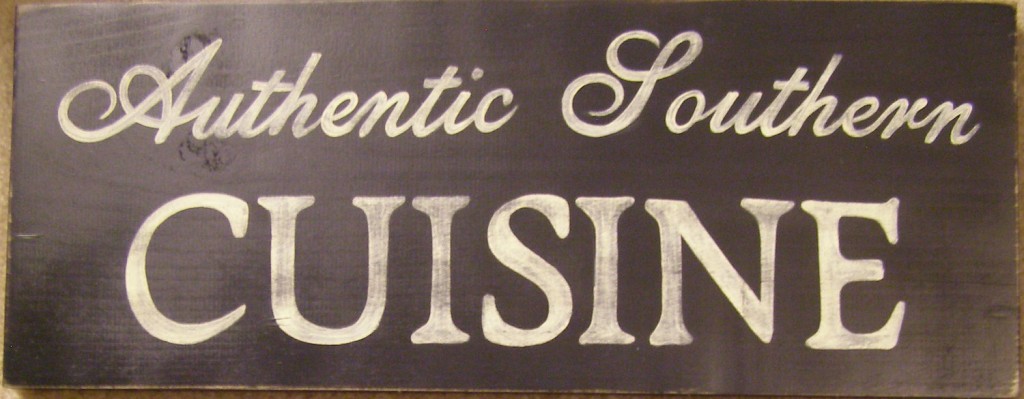 In a recent exchange between the spoiled, impetuous young King (who, on this occasion, was angered by a disrespectful comment from his uncle) and his far more seasoned, politically powerful grandfather, in season three of the TV series Game of Thrones, viewers heard the following:
In a recent exchange between the spoiled, impetuous young King (who, on this occasion, was angered by a disrespectful comment from his uncle) and his far more seasoned, politically powerful grandfather, in season three of the TV series Game of Thrones, viewers heard the following:
Joffrey Baratheon: I am the king! I will punish you.
Tywin Lannister: Any man who must say, “I am the king” is no true king.
The rule of thumb that I would propose is that as soon as we switch from just doing something ourselves to talking about doing it–telling someone else how to do it or comparing the various ways in which it is done–then whatever it was that we were doing is no longer what it’s all about. That this applies doubly when it comes to talking about someone else’s doings, no matter how fair and balanced we think we’re being, cannot be overlooked.
After all, here in Alabama people just call it “food” and eat it.
Persons, Displaces, and Things
 In early September 2013 there’s a conference in Liverpool, hosted by the European Association for the Study of Religions (EASR) and the International Association for the History of Religions (IAHR). The description of the event–entitled “Religion, Migration, and Mutation”–starts as follows:
In early September 2013 there’s a conference in Liverpool, hosted by the European Association for the Study of Religions (EASR) and the International Association for the History of Religions (IAHR). The description of the event–entitled “Religion, Migration, and Mutation”–starts as follows:

